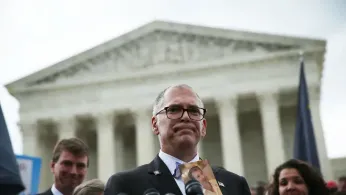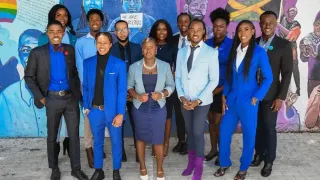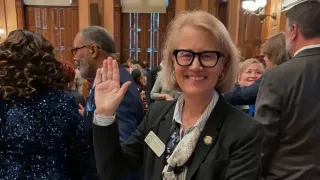
4 hours ago
Jim Obergefell Sounds the Alarm: Why the Supreme Court’s Marriage Equality Crossroads Should Have LGBTQ+ America on High Alert
READ TIME: 4 MIN.
If you’re queer in America, the date June 26, 2015, probably glows in your memory like a disco ball at Pride. That was the day the Supreme Court handed down Obergefell v. Hodges, the landmark decision that made marriage equality the law of the land, affirming that love—regardless of gender—deserves dignity, recognition, and the right to exchange matching wedding bands without a court battle. But now, the security of those rights is under threat, and Jim Obergefell himself is urging the LGBTQ+ community to pay attention.
On November 7, the Supreme Court will consider whether to hear a challenge that could reopen the question of whether marriage equality is a constitutional guarantee. Obergefell, wearing his signature rainbow bowtie, isn’t mincing words: “People should be concerned,” he warns—a phrase that lands not as a cautionary tweet but as a rallying cry for everyone who ever dreamed of saying “I do” in front of a crowd waving rainbow flags.
Marriage equality isn’t just a legal fixture—it’s a cultural touchstone. Obergefell’s story with his late husband John Arthur became the emblem of how queer love can reshape history, creating ripple effects that transformed everyday life for millions. Yet, in the years since the ruling, the political wind has shifted. The Supreme Court’s recent willingness to overturn long-settled precedents—most notably Roe v. Wade—has sent shivers through civil rights advocates.
Justice Clarence Thomas, in his concurrence to the Dobbs decision, explicitly called for revisiting Obergefell—a signal that marriage equality could be next on the chopping block. Legal experts note that while Obergefell relies on both the Due Process and Equal Protection clauses—offering broader constitutional footing than Roe—the current Court majority has shown a penchant for elevating religious objections and “history and tradition” arguments over contemporary civil rights.
When Jim Obergefell and John Arthur married aboard a plane on a Maryland tarmac—Arthur gravely ill with ALS—they weren’t just making a romantic gesture. They were making a statement: queer love deserves the same legal respect as anyone else’s. Their fight, and the fights of countless couples, led to a seismic shift not only in law but in culture. Now, with the possibility of Obergefell’s reversal, the stakes are deeply personal.
A reversal would throw families into chaos, with states once again free to decide who can marry and whose marriages they’ll recognize. From shared mortgages to parental rights, from hospital visitation to inheritance, the security provided by marriage equality could become a patchwork quilt—some squares warm and welcoming, others cold and null. “People start living together in anticipation that one day they will get married,” notes constitutional law scholar Doug Sears. “Eventually, they have a wedding. Often, people's families and friends help contribute to the wedding, and there are a lot of people relying on the fact that they are getting married. So this extension of reliance extends far beyond the couple.”
Let’s be frank—queer joy is radical. Every Pride parade, every Instagram post of a proposal, every drag queen officiating a wedding is a declaration that our love stories matter. The backlash against marriage equality may have stoked national debate, but it also heightened our visibility and galvanized our rights.
Obergefell’s warning is not a call to despair, but a call to action. Across social media, activists are mobilizing, reminding followers that legal victories are never permanent unless we defend them. Organizations like Equality Ohio and the Human Rights Campaign have launched urgent campaigns for legal literacy and civic engagement, encouraging supporters to contact their lawmakers, tell their stories, and—if it comes to it—take to the streets.
Legal experts are divided: some say the Supreme Court is unlikely to overturn Obergefell in the immediate future, citing enduring majority support and the difficulty of unraveling so many legal contracts at once. But the fact that the Court is even considering a challenge is enough to put the queer community on high alert. As Jim Obergefell puts it, “People should be concerned”—not just for their own marriages, but for the future of LGBTQ+ rights in America.
The challenge before the Court stems from the long-running case of Kim Davis, the Kentucky clerk who refused to grant marriage licenses to same-sex couples after Obergefell. While some observers argue that procedural issues may block a full-scale reversal, the mere possibility has already shaken LGBTQ+ communities nationwide.
To be queer is to be resilient—to find possibility in uncertainty and celebration in struggle. Obergefell’s legacy is a testament to the power of love, activism, and visibility. As the Supreme Court prepares to weigh the future of marriage equality, LGBTQ+ America is ready to show that our families, our futures, and our joy are not up for debate.
Whether you’re planning a wedding, raising a family, or just dreaming of a world where your love is honored, Jim Obergefell’s warning is for you. Stay vigilant, stay proud, and—most of all—stay united. The fight for equality is far from over, but we’re more than ready for what comes next.






